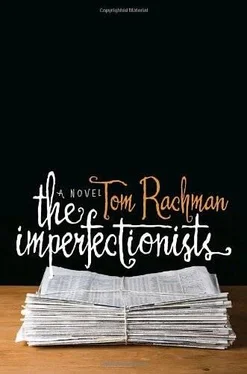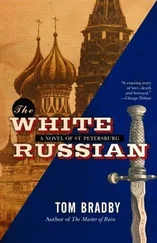The technician storms out, taking a dozen furious employees with him.
"My kids are at private school," Clint Oakley says. "How am I supposed to pay the fees now? What are they supposed to do?"
"Is the Ott Group offering buyouts?" Hardy Benjamin asks.
"I don't know," Oliver says.
"Not to be blunt," Arthur Gopal interjects, "but what's the purpose of this meeting if you're not able to tell us anything?"
"Would it be possible to talk to someone who can give us a bit more information?" Craig Menzies asks. "Kathleen? Abbey?"
Abbey steps forward. "Mr. Ott is the only person authorized to speak on behalf of the Ott Group." She steps back.
More enraged employees walk out.
"How long have you known this was coming?" someone asks.
"I just found out," Oliver answers.
Several staffers roar with incredulity.
"Total waste of time," someone says.
More people leave.
"Maybe if the Ott Group had tried investing in the paper at some point instead of running this place into the ground, we wouldn't be in this mess."
Oliver leans toward Kathleen. "What do I do?" he whispers. "I think this is getting out of hand. Should we end the meeting?"
"That's your call."
He turns back to the crowd, though it's not much of a crowd any longer. Only a few people stand before him. In various corners of the newsroom, employees commiserate, make unauthorized long-distance calls, put on their coats to leave.
"I'm incredibly sorry," Oliver says. "I keep repeating that, but I don't know what else to say. I'm going to try to get answers to all your questions."
"Could you bring in someone who actually knows something?"
"Yes," he says, nodding at the floor. "Yes. I'll try to get a proper person to come and talk to you."
Even Kathleen and Abbey have gone. It is him alone now, before the last few bewildered staffers. "Uhm, bye," he says.
He is lost for a moment, then stumbles toward Kathleen's office. But midway there he pauses. He turns his head, sweeps the hair from over his ears.
A noise is coming from down there.
Oliver hurries into her office. Abbey and Kathleen are kneeling on the floor.
Between the two women is Schopenhauer, looking not at Oliver but at the wall, in the direction that someone has twisted his neck.
The dog wheezes, his jaw hangs limply, he emits a curious sound. He cannot seem to draw a breath: his lungs expand partly, he winces, his chest falls. He is still lashed to the leg of the desk and Kathleen yanks at the leash. "Damn it!" She pulls the knot apart finally, but to no useful end: Schopenhauer has stopped moving. "Damn it," she repeats. She slaps the leg of the desk. "Damn."
"What happened?" Oliver asks. "I don't understand what happened."
"Someone came in, I think," Kathleen says, "while we all were out there."
But Oliver didn't mean that-he meant, What just happened? He meant, Why is Schopenhauer so quiet?
"This is sick," Abbey says. "Completely sick. And it was someone who works here. Did you notice who left the meeting early?"
"Almost everyone left early," Kathleen replies.
Abbey says, "I'm really sorry, Oliver."
"Extremely sorry," Kathleen says.
"Is he badly hurt?" Oliver asks.
Neither woman responds.
"We have to call the police," Abbey says.
"Don't, please," Oliver says.
"We have to find who did this."
"I'm going to take him now. Let's not," he says, "let's not blame people. I don't want to know who did it. They were all angry with me."
"That doesn't make it okay. This is disgusting."
"It's not anybody's fault," he says.
"Yes, it is," Kathleen insists.
Oliver slides his arms under Schopenhauer's limp body and, with a grunt, lifts the animal. "He always weighs more than I think."
He carries the dog across the newsroom, tugs open the elevator cage with his baby finger and enters, straining for the ground-floor button. But he cannot reach it and must put Schopenhauer down. "Good boy," he says, lowering his friend to the floor. "Good boy." He presses the button and stares up at the ceiling. The elevator rattles for a moment, then descends.
2007. CORSO VITTORIO, ROME
The final days of the paper were fraught. Some employees stopped turning up. Others looted computer equipment in lieu of future wages. A few drank openly, missed deadlines, even scuffled in the newsroom. Then the last day arrived, ended, and they were all, abruptly, free.
Some had jobs lined up, but many did not. A few planned to take time off. Others aimed to get out of journalism altogether. Maybe this is a blessing in disguise, they said, though it was hard to say how.
In Paris, Lloyd Burko was blissfully unaware of the commotion. He hadn't read the paper, or any other news, for months. He and his son, Jerome, lived together, scrimping and getting by, just. Each man believed he was looking after the other. Lloyd cooked with gusto, if badly, for Jerome and his skinny friends, a pleasant bunch of bohemians. They always invited the old man to join in their activities. Lloyd smiled thankfully at their offers but retreated graciously to his room.
To everyone's surprise, it was Arthur Gopal who got the most prestigious job, moving to New York as a reporter for a major newspaper. This was quite a change: doorstepping gunshot victims, getting yelled at by cops, feeding color to rewrite hacks who said things like "Yeah, we know the shooting took place in a soup factory, but what kind of soup?" A year earlier, Arthur had a wife and daughter. It was strange to think of that now, so he did not.
Hardy Benjamin found work in London, reporting on technology for a business newswire. Her Irish boyfriend, Rory, didn't have a job, so she paid the rent for their flat on Tower Hill. She bristled at those who suggested that he was living off her-in this regard alone, she refused to see matters in terms of business.
Kathleen Solson was rehired at her old newspaper in Washington, but to a lower-ranking position. Ultimately, the interlude in Rome hadn't served her career. She and her husband, Nigel, returned to their former apartment near Dupont Circle. She had a few days left before her new job started, so she caught up on the news online, took her books out of boxes, hung the oversize black-and-white photographs. Mostly, though, she wished this liberty were over.
Herman Cohen retired to write a history of the paper. He and his wife, Miriam, bought a house outside Philadelphia, and he told her, This is the last time I move. In the end, he never did start his book-it was so pleasant simply to be near the grandkids. When the little ones visited, he was in heaven, and no matter how much they abused the English language he never corrected their grammar.
Winston Cheung, after a period of sleeping in his parents' basement, found work at an exotic-animal refuge in Minnesota. He adored the job overall but disliked lining the monkey cages with newspaper-even the sight of headlines made him panicky these days. However, this was not to bother him for long: the local paper folded, and he switched to sawdust. Soon, even the monkeys forgot the comforts of newspaper.
Ruby Zaga could finally return home to Queens. And it was the last thing she wanted. Rome gave her solace. She had saved money and, in theory, could stay for years without working. The notion petrified her, then excited her. Her family-the beloved nieces, nephews, her brother-could come stay. She'd give them the grand tour. She had spent half her life in Rome. Half her life at the paper. She exhaled: she was free.
Craig Menzies left journalism to work at a lobbying firm in Brussels. He could afford to rent an entire house now and set up a science workshop in the garage. He even toyed with the idea of compiling a proper patent application. Often, he thought of contacting Annika in Rome, where she still lived. He had something to say to her, a point yet to make.
Читать дальше












